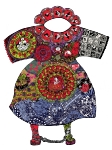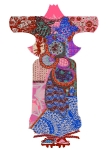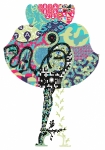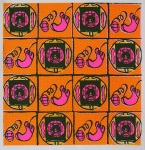MIN-TZU CHAO
1983
Taiwan
DOUBLE HAPPINESS – the wedding dresses of Taiwanese women from 1900 to present. 2010–2011. Digital print on papeR
Women’s feeling about love and marriage expressed through pattern. ”Women are made not born”. Simone de Beauvoir
A map not only shows geographical locations, but also tells stories. Symbols are used extensively in a map in order to convey information and to achieve visual communication. In this project, modern symbolism is used to interpret times in which Taiwanese women in four generations were born, lived and married. It seeks to understand the life experiences of Taiwanese women in a traditional, patriarchal Han society, and to unveil their courageous spirit. Furthermore, by reviewing the history of social changes, political interventions and women’s lives in the past few hundred years in Taiwan, it helps to better understand women’s ever-changing lives in modern Taiwan.
An understanding of Confucianism helps us to understand Taiwanese women’s situations over this time span. In a traditional society based on Confucianism, the value of paternity was emphasised, and the images of ‘macho men’ and ‘meek women’ were favoured. A son was valued more than a daughter, and education opportunities for women were restricted. Foot binding had been considered fashionable for centuries, since it made a woman looked delicate and frail. Also related to the harm of a woman’s body were the comfort women (army prostitute) that served the Japanese army in World War II when Taiwan was occupied by Japan. After the occupation by the Japanese, the Taiwanese’s national aspirations grew, social status of women also started to improve because of the rise of feminism. Today, globalisation has brought even more changes to the life of the modern woman in Taiwan
The first story is about a Child Bride which is based on my great grandmother’s story. Her name is A-Buy (阿買). In 1890 she was six years old and living in China, however she was sold as a bride for conventional and practical reasons and moved to Taiwan in 1893. At the time the prevalent view was that a son was much more valuable than a daughter. She came from a poorer family, and her mother had no other choice but to sell her as a child bride. There was no chance for a child bride to go to school; the only thing she had to learn in her life was how to be a housewife. She knew that one of the main purposes she was bought was for descendants. She became pregnant 12 times until she had a son. She experienced the wars between Qing dynasty and various countries. In 1894, China was defeated, and Taiwan was handed to Japan under the Treaty of Shimonoseki. Her innocent eyes were looking at the cruel reality of the society. Her life was restrained in day-to- day housework. She devoted herself to the family and that was her happiness.
Second is the story of my grandmother, Sweet-Olive (春桂). She was born in the Japanese occupation era in 1925. She fell in love with her Japanese schoolteacher, but the sweet dream finished when she was sixteen, when she had to accept the prearranged marriage organised by her parents. A wartime marriage was not simply about giving birth to a son. A wife had to become the centre of their family. While most of the men were in the army, women had to be independent and strong: they looked after children, hid when there was an air raid, did any part-time job needed, and sustained the very existence of the family. She not only supported her own family but also supported her man to resist the Japanese. The family and national consciousness was becoming more deeply rooted in her life, and she learned to become stronger. Her metamorphosis was accompanied by the changes of cultural and political circumstances during wartime. Surviving was all she cared about. She nurtured the love in her marriage. Keeping her entire family intact was where her bliss came from.
Following is the wedding dress of my mother, her name is Peony(牡丹). Born in 1949, she was married at the age of 24. She graduated high school, and enjoyed unprecedented peace and freedom in the age of the new Taiwan. She enjoyed Coca Cola from America, and read comic books from Japan. She dressed according to modern fashion and went to the cinema. After two serious relationships, Mr. Right finally came along. Peony was a career woman. Financial independence allowed women to gain freedom from their marriage. The conflicts between independent women and men were going on under the surface. There was a newly emerging celibatarian movement that challenged the traditional values of marriage. The constraints of society had been eased, therefore divorce and remarrying had become more common. Single-parent families and women who raised children on their own had also become inevitable phenomena. She pursued equality and independence. She enjoyed love. Happiness was held in her hands.
Finally, Spring- Flower (春花), age 28, who was born at the end of the 20th century and belongs to a generation who have grown up with technologies and the Internet. The source of her knowledge is highly diverse, and it has become much easier to communicate with various kinds of people. There are plenty of opportunities of falling in love both in real-life society and in virtual space. Diverse choice and fast-food love are full of stimulation and dangers. Instability and insecurity made her start to search for the meaning of life. There has been incompatibility between pursuing one’s own dream and starting up a stable family. She chose to leave traditional values behind and live in a foreign country. However, extreme freedom and restless pursuance also brings her a sense of being lost. She enjoys playtime and new experience and is always eager for more. Even freedom brings her solitude, confusion and a sense of being lost. She has to search for and recognise her own sense of happiness. Traditional values cannot help her in this search anymore.












